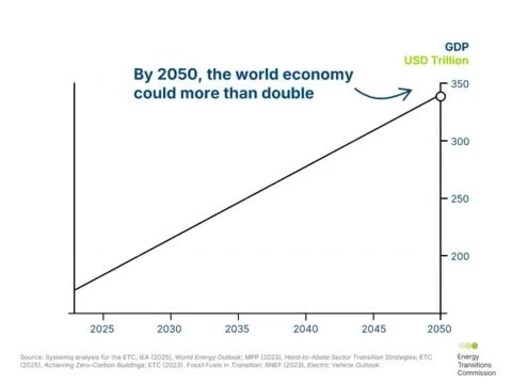LONDON, May 17, 2022 /PRNewswire/ -- In its latest Insights Briefing, "Building Energy Security Through Accelerated Energy Transition", the ETC explores how Europe and other regions can both build energy security and accelerate the required energy transition.
The brief assesses Europe's short term plans to cut reliance on Russian oil and gas, and estimates that gas imports could be reduced by at least 50% within a year, with further reductions dependent primarily on changes in consumer and business behaviour to reduce energy consumption.
But the key focus of the brief is on the medium term actions (2-8 years) which could improve energy security, stability of supply and limit the impact of future fossil fuel price shocks by 2030. The core of the response should be accelerated investment in renewable energy and economy wide electrification, together with improved energy efficiency. LNG imports from secure suppliers will also need to play a role, but must be combined with measures to reduce CO2 and methane leak emissions in gas production.
The brief has been developed in collaboration with ETC members from across industry, financial institutions and environmental advocates including Bank of America, BP, EBRD, HSBC, Iberdrola, Impax, Legal and General, Ørsted, Rio Tinto, Schneider Electric, Shell, Tata Group, Volvo Group and the World Resources Institute among others .
Adair Turner, Chair, ETC commented:
"It is vital to address the energy security and economic impacts of Europe's current situation in a way which does not delay and ideally accelerates the energy transition. To achieve this, we must recognise the different pace at which different types of response can deliver results; we must seize the opportunities for clear win- wins on energy security and transition: and we must face the need to make some trade-offs, particularly in the short-term. Over the medium-term however, it is clear that Europe and other regions across the world can enhance energy security while simultaneously accelerating the energy transition."
Clear Win-Wins
Clearly desirable actions include:
- Massive acceleration of renewable energy (with a strong focus on building storage and flexibility), through revising volume commitments in 2030 and actively bringing forward new capacity. Including renewable electricity for green hydrogen production.
- Energy efficiency and productivity including insulation, heat pump electrification and industrial energy efficiency
- Other sources of electricity, including keeping existing nuclear going and utilising existing sustainable biomass sources where possible
Difficult tradeoffs
Alongside actions which reduce European reliance on gas, new sources of supply will also need to play a role, with potential for:
- Increased LNG imports
- Increased / maintained output from existing gas fields
But the risks that too much investment in these alternatives will lead to carbon lock-in must be recognised and managed, and new investments and contracts must be designed to minimise production related CO2 and methane emissions.
Clearly undesirable actions
Actions which could seriously delay or imperil the energy transition are unnecessary and undesirable. These include any dilution of 2030 emission reduction targets or of commitments to phase out coal generation, or any large scale new oil and gas developments.
Making Renewable Energy Deployment Possible
To deliver accelerated renewable electricity deployment between now and 2030, the EU and national governments should focus on 4 key actions:
- Increasing targets for RE deployment to create market certainty about the pace of growth
- Setting clear programmes for RE auctions, supported by developments in power market design which can reduce consumer exposure to volatile gas prices
- Developing clear strategies to rapidly grow transmission and distribution networks, supported by policies to streamline and accelerate planning and permitting procedures .
- Accelerating the growth of demand for clean electricity, for instance via accelerated electrification of road transport.
Alongside the overall information brief, the ETC is also publishing 9 'ETC Explainer' briefs which provide further context on the situation on possible responses. ( see link below).
Ita Kettleborough, Director, ETC said:
"A profound transformation of the global energy system is ahead of us. In the medium term, a net-zero emissions economy with clean electrification at its core can offer countries greater energy security than today's fossil-based system. Whilst there are some tricky trade-offs in the very short term, the right choices now can both improve energy security and accelerate the energy transition by 2030. Governments, businesses and investors need clear strategies to achieve this goal – focused on deploying more renewable energy, mass electrification and improving energy efficiency."
"Building Energy Security Through Accelerated Energy Transition," constitutes a collective view of the Energy Transitions Commission. Members of the ETC endorse the general thrust of the arguments made in this report but should not be taken as agreeing with every finding or recommendation. The institutions with which the Commissioners are affiliated have not been asked to formally endorse the report.
To read the full report, and ETC explainers visit: https://www.energy-transitions.org/publications/building-energy-security/
Notes to Editors:
For more information on the ETC please visit: https://www.energy-transitions.org/
For link to the report and explainer content please visit: https://www.energy-transitions.org/publications/building-energy-security/
Photo - https://mma.prnewswire.com/media/1820030/Energy_Transitions_Commission.jpg
Logo - https://mma.prnewswire.com/media/1275002/Energy_Transitions_Commission_Logo.jpg







Share this article